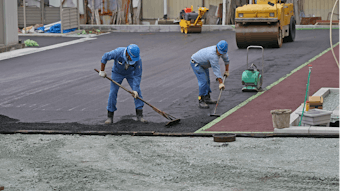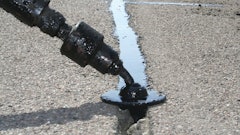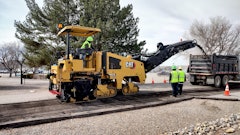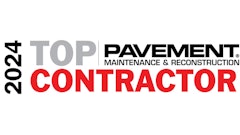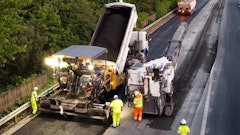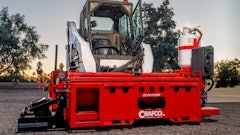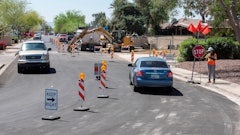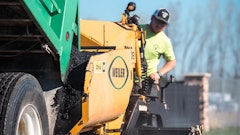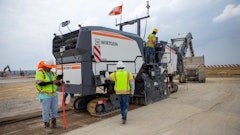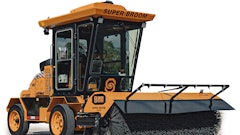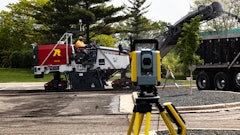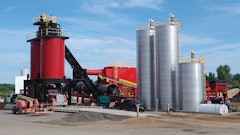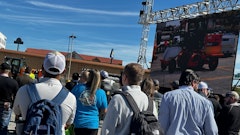While many people hope to hit it rich at the casinos in Las Vegas, Eric Reimschiissel, manager of the Asphalt Maintenance Division of American Asphalt & Grading Co., sees his profit opportunity outside the casinos by maintaining the roads that bring the millions of gamblers to the casinos annually.
Reimschiissel moved to Las Vegas in 2000 to start up a new road maintenance division for American Asphalt. He looked beyond the glitter of lights and saw miles of asphalt in need of maintenance. The hot Nevada sun and high traffic volume was beginning to take its toll on the city that never sleeps, and the opportunity to promote a maintenance/preservation approach prompted Reimschiissel to team up with an already established paving contractor, American Asphalt, to seize the moment by expanding its service offering through a maintenance division.
American Asphalt's full-service maintenance division provides sealcoating, as well as Types 1, 2 and 3 slurry seal, pavement patching and striping. His 60-crew maintenance division is equipped with four 350-gallon sealcoat application machines, four 3,000-gallon sealer transport tanks, three Valley Slurry Seal Macropaver slurry seal machines, two emulsion tankers and loader to support the slurry machines, two LeeBoy pavers, a concrete saw, a crack sealing kettle/applicator, two tampers, two skid steers, along with support trucks and trailers.
Reimschiissel runs one paving and patching crew, one sealcoating crew and one slurry seal crew. He currently subcontracts his striping service.
Slurry seal provides the greatest market opportunity for Reimschiissell and American Asphalt, with Type 1 and Type 2 slurry seal the predominant preservation choice specified by municipal street departments in Las Vegas and the surrounding communities. Pavements in the area are just starting to show their age and road departments have initiated an aggressive program to maintain and preserve their respective infrastructures. Within the first two years of operation, Reimschiissel's maintenance division contracted over 4 million square yards of slurry seal and its slurry seal crew set a single-day slurry seal record by applying more than 74,000 square yards of Type 1 slurry seal.
Las Vegas-size slurry jobs
With municipal customers in American's targeted market understanding the value of maintenance and preservation, many of the slurry projects Reimschiissel currently contracts are of Las Vegas proportions — big!
His slurry crew completed a $2.5-million project in 2004 for the city of Henderson, and Reimschiissel has contracted a similar project for the city this year. On the 2004 project, his slurry crew applied 225,000 yards of Type 1 (1/8-in. aggregate), 1.1 million yards of Type 2 (1/4-in. aggregate) and 460,000 yards of Type 3 (3/8-in. aggregate) slurry, along with 300,000 pounds of crack seal.
"The project covered the full gamut of varying road conditions, with some requiring patch work, some crack seal, and others very little preparation," Reimschiissell says. "But none of streets had ever been treated."
What Henderson's Department of Public Works and other municipal road agencies are trying to implement is a seven-year maintenance schedule to keep their respective road systems in good condition.
"Once we can initially treat all the roads within a municipality's jurisdiction, it will then be time to go back for a second treatment," Reimschiissel says. "And once we can get those customers to continue to maintain those roads on a seven-year rotation cycle, then they'll begin to see the benefits of maintaining structurally sound roads and they will realize just how long an asphalt road can be kept in good driving condition."
The biggest challenge for Reimschiissel's slurry crews in undertaking a project of that size is maintaining traffic control.
"We try to take care of all our prep work a couple of weeks in advance, so that when the slurry crews show up they can begin applying the slurry and within an hour and half to two hours we can open the treated road surface back up to traffic," he says.
Temporary lane tabs are applied and permanent striping is then put down approximately 10 days after the slurry seal has had time to cure.
Reimschiissel has established an efficient application process by equipping his slurry crew with three slurry machines. While one machine is applying a latex modified slurry (which is more resilient to the hot Nevada weather conditions), the other two are at the staging area being reloaded with the emulsion, water and aggregate required for the job. Typically, American's slurry crew can apply 35,000 yards of Type 1, 30,000 yards of Type 2 and 25,000 yards of Type 3 slurry in an eight-hour shift. But with perfect conditions, Reimschiissel's crew has applied as much as 74,000 yards of Type 1 slurry in a day.
Business growth
American Asphalt's maintenance division generates approximately $10 million in annual revenue from slurry, sealcoating and patching projects. While slurry seal represents the lion's share of American's maintenance business, catering to municipal accounts in Mesquite, Yuma, Henderson and Las Vegas, for residential sealcoating generates the largest number of jobs.
A sealcoating crew can apply 50,000 to 70,000 square feet of double coat sealer per day, and the demand for that service in many of the new subdivision developments around Las Vegas may lead to Reimschiissell adding another crew.
The advantage American has in aggressively pursuing sealcoating work is that it produces its own mineral-filled asphalt emulsion sealer. It also has two storage tanks — an 8,000-gallon tank and a 10,000-gallon tank, which allows it to produce and store different formulated sealers. Producing its own sealer is less expensive than paying the shipping costs required to bring in sealer from a supplier, and it also gives the contractor flexibility in producing sealer for a specific application. Some customers require more sand or more latex, and American can accommodate those requests in short order.
For Reimschiissel and American Asphalt, maintenance and preservation work is a natural fit for the full-line of services the contractor wants to offer, and the growth potential is obvious as more road agencies realize the benefits of investing dollars to preserve a road system. And while American is bidding on work in other states, the Las Vegas area remains its primary focus for growth.
"People in this area take great pride in how everything looks and they want their streets to look good as well," Reimschiissel says. "Agencies understand the benefit of using preservation as a way to not only keep their streets looking good, but also keep them in good condition longer. They now require developers to treat new roads (sealcoat) before releasing those roads over to the counties which will ultimately be responsible for maintaining them.
"When you have agencies taking that approach with a new road, you know they want to make that road last as long as possible," Reimschiissel says. "And that means we'll have plenty of work for a long time, and as the Las Vegas area continues to grow, we'll continue to be right there offering our services to help preserve the investments made in building and maintaining good asphalt roads."
